
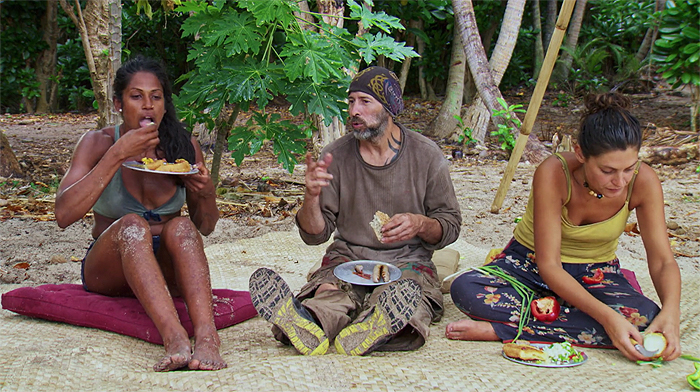
So that was it. The fabled, elusive all-winners season that Survivor fans have been clamoring for since ... well, pretty much since there were 16 winners to fill an original-sized cast ... it finally happened! And it was good.
Sure, there were aspects that were sub-optimal, like the inclusion of Edge of Extinction. The fire tokens and the constant downpour of advantages were at times confusing and unnecessary. The old-school legends like Boston Rob and Parvati and Ethan were outnumbered from the beginning, and never really had a legit shot at playing.
But still, this was one of the best Survivor casts ever, if not *the best* one. We were treated to surprising big moves (Denise blindsiding Sandra with her own idol, the Sophie blindside), unexpected comedy (Tony's ladder, Tony and the shark, the buddy system on steroids, Adam's ill-fated quest for a podium idol), and even emotional depth (Ethan vs. the log challenge, everyone gets a loved ones visit, Sarah and Tony's three-season connection). We had a battle for supremacy between Kim and Tony. We had Natalie's season-long domination of the Edge, and gleeful attempts to disrupt the regular game from afar.
Through it all, we had a return to form of the guy presumed to be a unicorn, the charismatic, hyperactive cop nobody thought would ever be able to repeat his Cagayan performance. We saw him pulling off wacky stunts (like the ladder) in a desperate attempt to keep himself occupied while toning down his perceived threat level early in the game. And it worked! He somehow made it through to the merge without receiving a vote, regrouped, bided some more time, then with his core alliance assembled, meticulously dismantled all the other power players, then survived the Edge returnee's finally in-person attempts to wreck his game. It was a surprisingly measured, thoughtful approach, and much more well-rounded one than his frenzied dash through Cagayan, this time incorporating a stronger social game and some individual immunity wins.
It was also a season where, presented with another impressive end-game run by someone who spent the majority of the season on Edge of Extinction, the jury this time rewarded the actual 39-day Survivor game instead. As a result, it was the second season in a row that reaffirmed the importance of the core social-strategic game, rather than the tacked-on format changes and superfluous twists.
Maybe it wasn't the best season ever, but it was a pretty damn good one. And given that it's the last season we're getting for a while, it was a reassuring place to take a pause.
In the end, the real winners at this war were the friends they made along the way
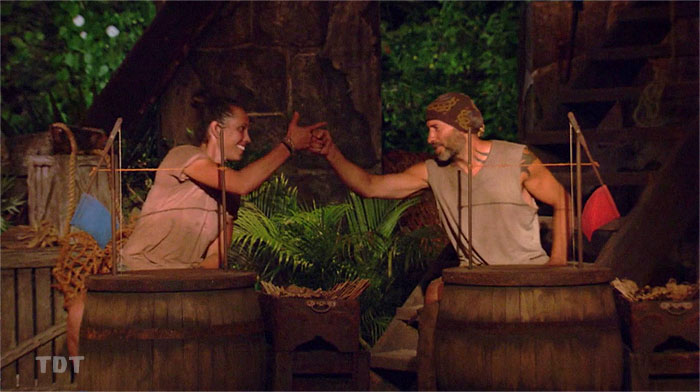
One of the most surprising and ultimately rewarding developments this season was the show's breaking with past precedent, and choosing to address and explore the fact that many of these returning champions had connections to each other from outside the game. Those bonds ranged widely, from the fanciful, hours-long "poker alliance," to the Marianos' obviously concrete decade of marriage and four children.
In a lot of ways, this was a stealth Blood vs. Water season. You had the actual married couple in Rob and Amber. You had two pairs of original-season allies in Tony and Sarah from Cagayan, and Natalie and Jeremy from San Juan del Sur. You had four people who played together on the same tribe in Heroes vs. Villains (Rob, Parvati, Sandra, Tyson). You even had a former dating couple, in Michele and Wendell. And all these relationships played an important role in the season, as did the new ones people formed while playing: like Sophie and Sarah, or the Ben/Sarah/Tony trio.
The importance of these connections was no clearer than with the demonstrably deep bond between Tony and Sarah. They repeatedly swore they had each other's back, and despite seeming like those assertions might actually be cover for a race to re-enact/ seek revenge for Tony's merge blindside of Sarah in Cagayan, they actually never wavered. This continued to build, up until their epic face-off over fire. The tear-soaked aftermath of which made evident that they actually meant it. This was not glib Cagayan Tony, gleefully knocking out his buddy LJ. This nearly broke him. It was unexpectedly human moment for Tony, and because of that, powerful.
Tony spent the season intentionally making friends and connecting with people on a "real" level. Sometimes that wasn't enough — Tony had a fun cops vs. firefighters rivalry with Jeremy, built on mutual respect, but Jeremy's own original-season, deep connection with Natalie was always going to supercede that, just as always happens in a Blood vs. Water season. But other times it did work: with Nick, with Denise, with Ben. Those relationships helped earn him that eight-vote jury vote margin.
The counterpoint to that: Natalie. In contrast to Chris Underwood, who napped, caught fish, and formed close relationships with every jury member, Natalie's singular focus while on the Edge may have interfered with relationship-building. According to Boston Rob at Final Tribal, Natalie distanced herself from other people on the Edge over the closing week there, in order to maintain her focus on returning to the game. (From her interview with Dalton Ross, it sounds like maybe she also shifted her attention to the later-arriving jurors, like Kim and Sophie, to no avail.) Natalie's natural, otherwise refreshing bluntness ("These idiots haven't left the shelter all day") may also have worked against her.
Either way, this refreshing focus on past and present relationships made for an unexpectedly rawer and more emotional season, a much more fully fleshed-out depiction of the agonizing internal conflict involved in making friends with people, then voting them out. Past Survivor contestants have talked about this on the show before, certainly, and have even shed tears about it in confessional. Lisa Whelchel did so, as did Dawn Meehan. But this was the first time the show has also embraced that story for the winner. And by showing the exuberantly flip-flopping, high-energy Tony *also* living through this struggle, Survivor is telling its audience: It's okay. It's part of the game. It's hard, and there are actual stakes here.
It's also telling us: You can win while still caring about people. And in a world gripped by pandemic, maybe it's a good thing that a show that normally embraces borderline sociopathic behavior in the name of entertainment can still encourage us to care.
The post-Edge reflections
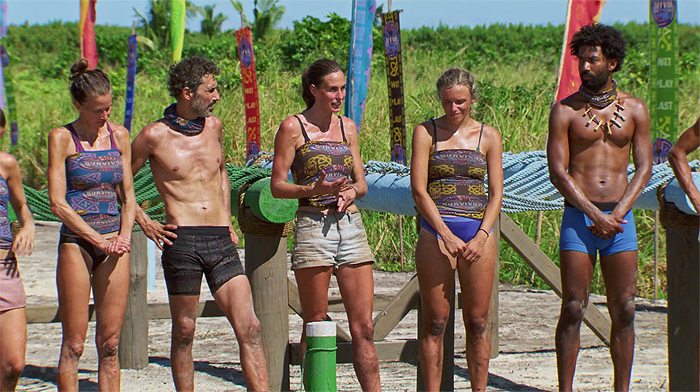
When it was mostly newbies in Season 38, Edge of Extinction, the bit where Probst interrogates the former Edge people who *didn't* return to the game at Final 5 felt a bit manipulative, like milking depleted people for tears in a situation where you have a 100% likelihood of succeeding. But the approach the show took here, with this cast — legends, revered winners, all people who have won before but are now faced with the reality that they definitely won't win this season — it worked.
This time, the segment was actually illuminating because it was more than just shoving a microphone in someone's face and saying, "Hey there! You just LOST! How do you feel?" Rather, as Probst framed it, it was: "If this is the end of Survivor for you, wrap up your story for me." That was the perfect approach, because for a lot of these people, they won't be back, and it was good to see so many of them feeling at peace with their performance.
This was a unique opportunity, with a group of 13 now-departing winners, to reflect on two decades of the show, and what it's meant to those former champions. It was exactly the right tone to strike, and for once, every last one of those tears felt earned.
Kim Spradlin probably said it best: It's okay to come out, screw up, and not win. They're all playing against some of the best players ever. They can't all win this time. Tyson gave a uniquely Tyson perspective, with his: "This is the only job built for me. This game encompasses all of my weird talents."
Later-eliminated players also had similar points of view. Ben said: "I want to walk away from Survivor and actually have actual friends. Because having friends is worth more than money." Sarah, upon being eliminated, told everyone "It's okay. And when you hear someone say that, it doesn't mean they're giving up, it's that they got something valuable out of it." As Denise and her tattoos said, Endure, and Let Go. In the end, the real winners at this war
This season spent a lot of time exploring the lingering post-game effects of playing Survivor. This is a cast of people who all have won the game before, but in many cases, the game and the reactions it produces still has a hold on those people two or more years after their victory. In acknowledging that it's not simply an action film of Big Movez, epic challenges, and flashy blindsides played out over 14 episodes, this is the most three-dimensional and introspective Survivor has allowed itself to be.
If this is the end, that's a great way to end it.
(If it's not the end, well, Jeff Probst now wants to inflict this psychological trauma on an entire tribe of teenagers, so, uh ... yikes.)
End-game Natalie = DK Chillin 2.0
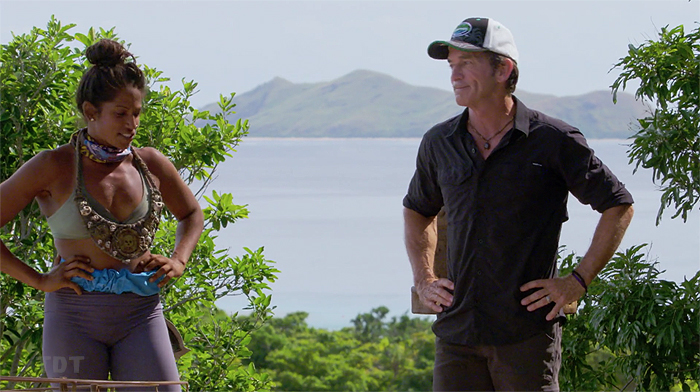
From the "Jury Speaks" videos, the jury's decision generally seemed less about devaluing Edge of Extinction and days played in the game, and more about valuing the traditional Survivor social/strategic game. We saw not so much a repudiation of Chris Underwood's win, but rather a second straight affirmation of the same principles the Season 39 jury endorsed in picking Tommy Sheehan over Dean Kowalski: controlling the game and building relationships, vs. building up an array of advantages and trinkets. Which is sort of amazing, because they had all just seen Chris Underwood's win, and hadn't yet seen Tommy's. (Well, Boston Rob probably knew the outcome.)
In that sense, Natalie was the second coming of Dean — she had two idols, all those fire tokens (14!), she found and sold all those advantages into the game. Also similarly to Dean, she was facing a guy who, with his female partner, ran the post-merge game. Once again, the jury chose that latter, more traditional Survivor game over the trinkets and twists. That's a reassuring outcome for Survivor fans. The players keep telling Probst the core game is what's important, not the window dressing. Since he doesn't listen to the fans, hopefully someday he'll hear the players.
Still, could a case be made that Natalie's in-game run from Days 35 to 39 was sufficient for the victory? (Combined with her time dominating the Edge?) While she did shake things up and contribute to the disintegration of Tony's alliance, her gameplay after coming back could still — as Boston Rob stated while voting — have used some improvement. While she did a lot right, she also made a series of minor errors, listed below.
Playing it safe. Natalie attended just three Tribals: she was voted out once (Day 2), then had protection the other two times (three times counting the firemaking at F4). According to Parvati in her The Jury Speaks video, Natalie played recklessly in the first two days at Sele, and was an "easy vote" for the first boot. After coming back in, she made it to the end via an idol play, another idol play, and an immunity win (to avoid fire). Getting to the end via idols is exactly what Ben was criticized for in his HvHvH win, but at least he survived a few votes without one. Natalie's path from F6 to finals was a defensive one, or at least a well-defended one. Had she become the champion, Natalie would have set the record for fewest people voted out by a winner, with just one in, ironically, Ben (since Denise left on a revote).
Not creating allies from the Edge: There may have* been something else she could have done that would have been a far more effective use of her fire tokens than buying an idol for Tyson. The post-merge Edge of Extinction menu is up for auction on eBay, and it lists an unused opportunity: "Create an ally." For just two tokens, Natalie could have sent one (or more?) extra votes into the game to topple Tony's alliance from afar. For instance, after Jeremy was voted out on Day 31, she (maybe*) could have sent Nick and Michele a vote each. That would allow them to at least force a tie, or possibly even convince Denise to join them.
(*As always, we don't know what we don't know, and production may have secretly blocked this. In Island of the Idols, there appeared to be a hidden rule that contestants could only visit Rob and Sandra once. Here, it appears there may have been a secret rule that each player could only receive an advantage-purchasing offer once from the Edge, in which case Nick's and Michele's chances had already been burned, and Denise was the only option for "creating an ally." In that case, an idol for Tyson was probably the best choice available to Natalie.)
Missed idol opportunity: Natalie playing her idol for herself at Final 5 was also a misstep: If she had instead played that idol for Michele, that would have been a huge, brazen move, echoing her idol play for Jaclyn at F5 in San Juan del Sur. Playing an idol for Michele would have very publicly seized control, guaranteeing that Ben would leave. Instead she appeared nervous, showed the jury she was unsure where the votes were going, played it defensively, and left her ally Michele exposed to whatever happened.
Misplaying it safe with fire: Obviously, giving up the necklace at F4 and volunteering to make fire should *not* be mandatory. But it appears Boston Rob personally taught everyone on the Edge to make fire, precisely so that one of them could win via the Chris Underwood method. Natalie declined to follow through. Going against the jury's expectations probably isn't the best choice. Then she further compounded the error by picking Sarah and not Michele — who was really good at fire — to battle Tony. She needed Tony out! In the worst-case scenario there, Michele loses and departs, which means Tony and Sarah might split some votes. Sarah almost certainly gets Sophie, maybe Kim, maybe Adam. Natalie's also the clear scrappy underdog in that scenario, which might further swing a vote or two.
In the end, though, none of these were probably the main reason the Final Tribal vote broke the way it did. More than anything, the jury felt they should be rewarding the best game of Survivor, not the best game of the Edge. Natalie had the latter, clearly. Hers was still an impressive journey, grittily, unrelentingly working her way back from being the first boot all the way up to second place. She'd probably rather have $2 million to show for it, but it's still something to be proud of.
Shorter takes
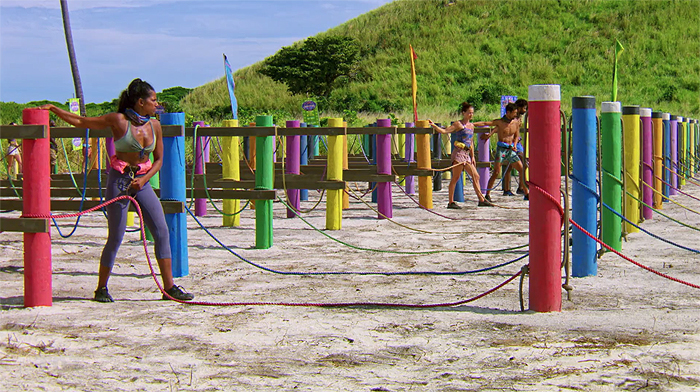
- One last fire token mystery: Tyson and Sophie each earned two fire tokens on Day 29, just six days before the re-entry challenge. One week later, though, their tokens were apparently gone: Tyson's total was shown as zero in Ep13, Sophie's wasn't shown, and neither bought the first advantage. They're both smart players who understand the importance of advantages in these challenges. Tyson was even in the running to win the challenge with one ball placed, and might have won had he had that advantage. So what happened to their tokens? As with all things token-related we'll probably never know.
- Credit to the show for pointing out its own flaws: The Final 6 Tribal Council had one of the better discussions ever for moving Survivor forward. Letting Sarah talk about gender bias with respect to the way women are viewed for playing an aggressive strategic game was great, and kudos to Probst for acknowledging and pledging to grow from his own shortcomings in the way he views male vs. female players. It was also great that Tony was allowed to point out the biggest flaw in Edge of Extinction: The F5/6 returnee comes back into the game with almost omniscient knowledge base — they know the current feelings of every juror, AND they also are aware of almost everything that's going on in the game, thanks to downloads from the booted players. Information is power in Survivor, and the final EoE returnee wields a huge amount of that power. It's incredibly unbalanced, and is one of the many reasons that if/when EoE comes back (it always does), the second return challenge should be ditched. End it at the merge, and most of the objections to the Edge go away.
- Sharing the necklace: Each member of the final three won immunity once in the finale. This is the only time that's ever happened in a Final Three season (although, to be fair, older seasons rarely had three finale ICs). But back when there was a Final Two, obscure, deep-cut couple Rob and Amber Mariano also accomplished this feat in All-Stars, as did Vecepia Towery and Neleh Dennis in Marquesas.
- The alliance of three, united in futility: There were a lot of records broken in counting stats this season (Boston Rob's fifth appearance as a contestant, Parvati running up the score on voting people out, Rob and Parvati extending their leads in days played). Rather than focus on these, let's look at some of the sillier ones. For all the great stuff they did this season, the alliance of Tony, Ben, and Sarah also set some less-enviable records.
- Ben and Sarah both tied Sandra for most winless individual challenges played (with 20), then Sarah went on to seize that record for herself, with 21. (Note that Sandra could have forced a tie just by sticking around three more days.)
- Not to be outdone, Tony has now played three idols and has yet to cancel out a single vote. He's the only person to play even two idols without voiding a vote, in fact.
Good players sometimes set records they'd rather avoid. It happens. But we're still happy they were out there trying. We don't know how many of these people we'll see play again, but it was fun watching them do so this time around.
 Jeff
Pitman is the founder of the True Dork Times, and
probably should find better things to write about than
Survivor. So far he hasn't, though. He's also responsible
for the Survivometer, calendar, boxscores, and contestant
pages, so if you want to complain about those, do
so in the comments, or on twitter: @truedorktimes
Jeff
Pitman is the founder of the True Dork Times, and
probably should find better things to write about than
Survivor. So far he hasn't, though. He's also responsible
for the Survivometer, calendar, boxscores, and contestant
pages, so if you want to complain about those, do
so in the comments, or on twitter: @truedorktimes
Other Winners at War Episode 14 recaps and analysis
- Gordon Holmes at XfinityTV.com: "And the Winner Is..."
- Dalton Ross at EW.com: "Dominance is rewarded"
- Dalton Ross & Jeff Probst at EW.com: Q&A
- Andy Dehnart at Reality Blurred: "Survivor: Winners at War: a great finale, but not the greatest season"
- Andy Dehnart at Reality Blurred: "A bonus Survivor: Winners at War episode, and 3 other recommendations"
Exit interviews - Tony Vlachos (winner)
- Gordon Holmes at XfinityTV.com (5/14/20): "Gordon interviews Tony Vlachos" (YouTube)
- Dalton Ross at EW.com : "Tony Vlachos reveals all his antics we DIDN'T see on Survivor"
- Mike Bloom at Parade.com (5/14/20): "King of the Survivor jungle! Tony Vlachos tells his Winners at War story"
- Rob Cesternino at RHAP (5/14/20): "Survivor 40 FINALE Exit Interviews with the Final 6"
Exit interviews - Natalie Anderson (2nd place)
- Gordon Holmes at XfinityTV.com (5/14/20): "Gordon interviews Natalie Anderson" (YouTube)
- Dalton Ross at EW.com (5/14/20): "Natalie Anderson on the Survivor votes she's surprised she didn't get"
- Mike Bloom at Parade.com (5/14/20): "Natalie Anderson goes from the Edge of Extinction to the verge of victory on Survivor: Winners at War"
- Rob Cesternino at RHAP (5/14/20): "Survivor 40 FINALE Exit Interviews with the Final 6"
Exit interviews - Michele Fitzgerald (3rd place)
- Gordon Holmes at XfinityTV.com: "Gordon interviews Michele Fitzgerald" (YouTube)
- Dalton Ross at EW.com (5/14/20): "Michele Fitzgerald on why fire tokens did not equal votes"
- Mike Bloom at Parade.com (5/14/20): "Michele Fitzgerald on her journey of reintegration and validation during Survivor: Winners at War"
- Rob Cesternino at RHAP (5/14/20): "Survivor 40 FINALE Exit Interviews with the Final 6"
Exit interviews - Sarah Lacina (4th place)
- Dalton Ross at EW.com (5/14/20): "Sarah Lacina explains origins of her gender bias speech"
- Mike Bloom at Parade.com (5/14/20): "Sarah Lacina gets put in the line of fire in Survivor: Winners at War"
- Rob Cesternino at RHAP (5/14/20): "Survivor 40 FINALE Exit Interviews with the Final 6"
- Phil Wood & Alexa Pappas at Survivor Specialists (5/18/20): "Survivor 40: The Sarah Lacina Tell-All"
Exit interviews - Ben Driebergen (5th place)
- Dalton Ross at EW.com (5/14/20): "Ben Driebergen explains his stunning Survivor decision"
- Mike Bloom at Parade.com (5/14/20): "Ben Driebergen makes a Survivor sacrifice in Winners at War"
- Rob Cesternino at RHAP (5/14/20): "Survivor 40 FINALE Exit Interviews with the Final 6"
Exit interviews - Denise Stapley (6th place)
- Dalton Ross at EW.com (5/14/20): "Denise Stapley reveals she almost took out Tony instead of Sandra"
- Mike Bloom at Parade.com (5/14/20): "Denise Stapley Learns to Slay, Endure, and Let Go on Survivor: Winners at War"
- Rob Cesternino at RHAP (5/14/20): "Survivor 40 FINALE Exit Interviews with the Final 6"
Podcasts
- Rob Cesternino & Stephen Fishbach at RHAP: "Know-It-Alls | Winners at War FINALE Recap"
- Shannon Guss at RHAP: "Survivor Global | Winners at War FINALE Recap | Nick Iadanza"
- Andy, John, Emma & Matt at The Purple Rock Podcast: "Winners at War Episode 14: It All Boils Down to This"
- Dom Harvey & Colin Stone at The Dom & Colin Podcast: " -- Episode 14 Recap/Analysis"
- Dwaine Stroud & David Jones at Survivor Talk w/ D&D: "Survivor Winners at War, Episode 14 Recap"
- Ryan Elder & Scott Chernoff at Snakes, Rats & Goats: "Survivor Winners at War Finale w/ Myles Nye"
ADVERTISEMENT